#dear ijeawele: a feminist manifesto in fifteen suggestions
Text
going to try and put down any simple thoughts I have instead of staring into space with a clench in my heart and strong emotions.
all of it is wisdom. Sometimes it made me laugh a lot. Sometimes it made me laugh in a sobbing way for how things still were. Sometimes it made me angry too, in a way that says 'things must change'. Sometimes it made me go 'oh', in a way that says 'i recognise this in real life. She put it into words, the wrong feeling I had.'
It was always thought-provoking.
2 Feminist Tools:
First: 'I matter. I matter equally. Not 'if only'. Not 'as long as'. I matter equally. Full stop.
Second: Can you reverse X and get the same results? eg. If Chudi sleeps with another woman and you forgive him, would the same be true if you slept with another man?
The conversational, warm tone, as if you are a friend listening in (it was originally written for a friend whose daughter was just born, who asked 'how can I raise my daughter feminist?') works so well, and makes it so accessible for a topic as thorny as feminism, and one that can easily get lost in jargon.
The wry humour and occasional snark was delicious too, and added to the readableness of this (it's a really thin book!!)

She just says it simply. She says it as it is, with bravery and honesty.
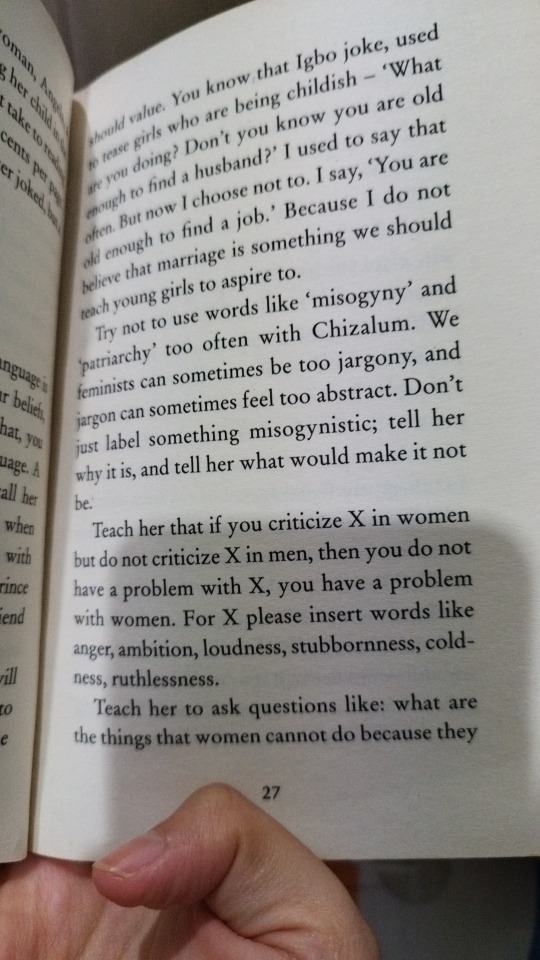
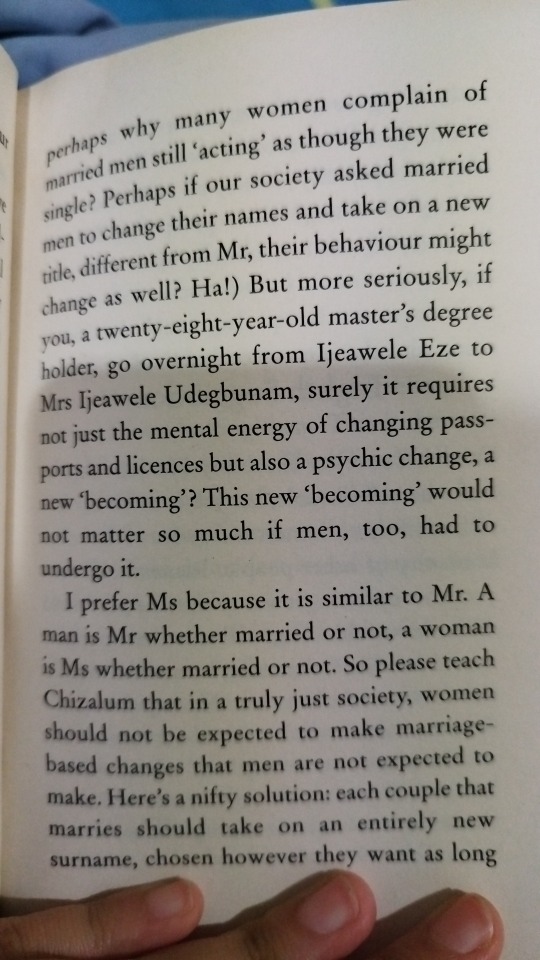
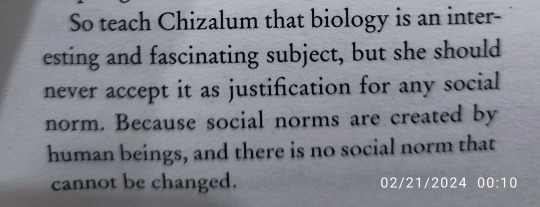

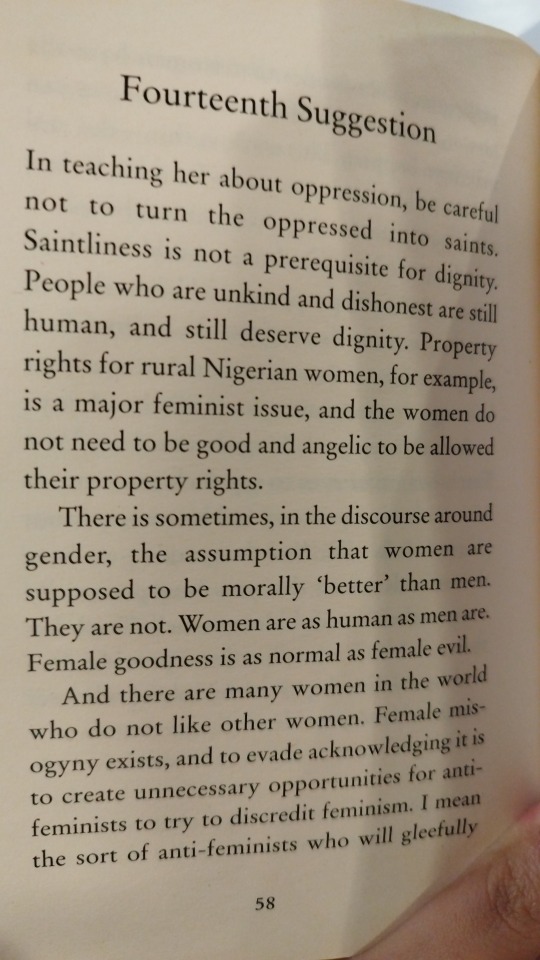
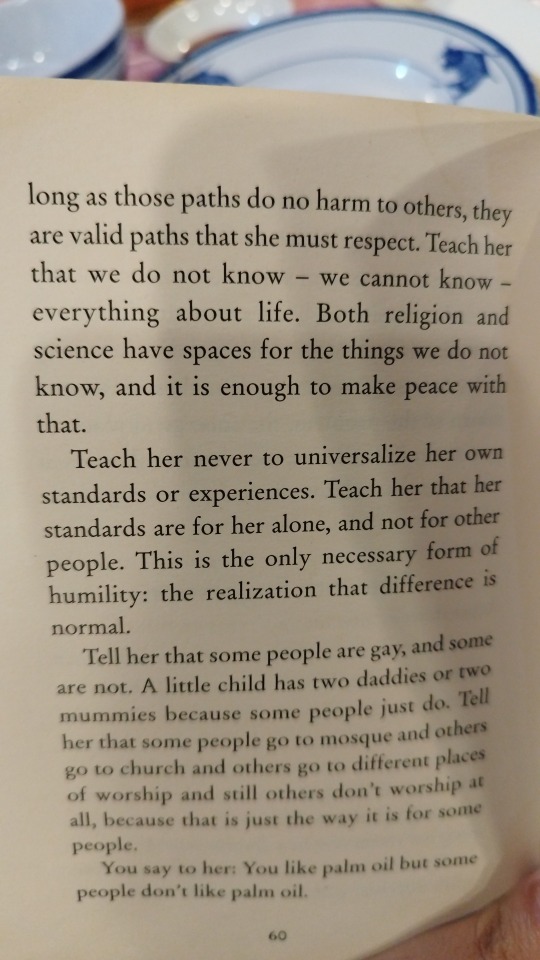

That. Is the best ending for this book.
It's a lot of reflection and thought distilled into one book -- about equality for everyone, between men and women, bad and good, and the spectrum in between, and emphasises acceptance of all diversity. And to be honest, open-minded, and to question all social norms.
#dear ijeawele: a feminist manifesto in fifteen suggestions#chimamanda ngozi adichie#books#Oh thank fucking god it saved automatically when my browser froze I would not have liked having to rewrite this all over again#books-ed-read-2024
3 notes
·
View notes
Text
Dear Ijeawele, or A Feminist Manifesto in Fifteen Suggestions, is a modified letter written from Chimamanda Ngozi Adichie to her childhood friend who asked how to raise a feminist daughter. She admits it's a hard question, and after having a daughter of her own she said it's easier said than done.
Tonight (Monday), I finished the introduction and the first six suggestions. I plan on finishing the other half either later tonight or tomorrow. It’s a quick read (~60 pages) and I recommend it to any feminist, regardless of whether she has or plans to have daughters. I wrote a summary and notes of my own for each section in case anyone wants a TLDR.
Introduction
The premise of feminism should be “I matter equally” with no stipulations. For example, she says to ask yourself “Can I reverse x and get the same result?” If your husband cheated, is the feminist response always to leave? Ask yourself if he would stay if you cheated. If the answer is yes, then staying does not contribute to gender inequality. The reality is that the answer is typically no, because there is a lower bar for men when it comes to infidelity. Personally, I believe that focusing on an individual relationship as opposed to societal norms and trends is a mistake. A woman choosing to stay with an unfaithful husband is not a neutral act even if he would to the same for her.
She remarks that her friend’s daughter is already so curious about the world. Most people would remark on a newborn’s appearance, as they typically have few defining features beyond which parent they resemble. Choosing an active rather than passive trait to complement set the tone for the rest of the letter.
First Suggestion
Be a full person, meaning don’t define yourself by your motherhood. Don’t apologize for working and taking time for yourself. Also don’t be surprised when you make mistakes and remember to ask for help when you need it.
People cite tradition selectively. Her SIL suggested she be a stay-at-home mom because it’s “traditional,” despite the fact that double income families is an Igbo tradition.
Already from the first suggestion I can tell she has a wonderful sense of humor. Adichie references their childhood and mutual friends in a way that makes you feel like an old friend as opposed to a stranger hearing an inside joke.
Second Suggestion
Your husband is just as capable of (and should be doing) everything short of breastfeeding the baby. Equal childcare doesn’t always mean 50/50 every single day, but you’ll know when it’s equal because there will be no resentment. Personally, I believe many men would resent having to do childcare because they still believe it is women’s work. I also think the existence of the nuclear family should change, not just the expectations placed on the father.
Third Suggestion
Domestic skills benefit everyone and shouldn’t be exclusively taught to girls. If we stopped viewing marriage as a prize for women, we would stop asking whether women should perform domestic labor in order to “earn” a husband.
We teach our children gender roles unconsciously, but it is easier to raise our daughters to be confident and reject gender roles than it is for them to unlearn it later.
Don’t assume your daughter can’t do something. Even if she can’t yet, let her try so she becomes confident in her ability and doesn’t feel restricted by gender roles.
Fourth Suggestion
Adichie defines Feminism Lite in a few different ways. It’s when men say they “allow” their wives to have a career or they’re the man of the house but their wife is the one “really” in charge behind the scenes. The examples she gives are better than any individual point I could summarize here.
We judge powerful women far more than powerful men. The implication is that male dominance and power is natural, but women have to either earn or compensate for their power by being humble and domestic.
This is the section where I got the quote from earlier btw.
Fifth Suggestion
Teach your daughter to read, preferably by example but if she’s still not interested reward her for reading. It will help her learn about the world and herself. It’s also important that she read a wide variety, not just what is given to her at school.
Sixth Suggestion
Begin by questioning your language and then teach your daughter to question language. What you say teaches her what she should value.
Terms like misogyny and patriarchy are sometimes too abstract for a child, so focus on specific examples. Point out what is misogynistic about it and what can be done differently. If someone criticizes X in men but not women, their problem is with women and not X. Also teach her to recognize when men revere women (e.g. call them special, divine, superhuman) because this is based on chivalry and infantilization, not respect.
#book review#book recs#reading list#dear ijeawele#a feminist manifesto in fifteen suggestions#chimamanda ngozi adichie#radfems interact#radfem safe#radfems please interact#radfems please touch#radblr#terfblr#terfs please interact#terfs do touch#terfs do interact#terfs interact#terf safe
21 notes
·
View notes
Text
In teaching her about oppression, be careful not to turn the oppressed into saints. Saintliness is not a prerequisite for dignity. People who are unkind and dishonest still deserve dignity. Property rights for Nigerian women, for example, is a major feminist issue, and the women do not need to be good and angelic to be allowed their property rights.
– Chimamanda Ngozi Adichie (2016) Dear Ijeawele, or a Feminist Manifesto in Fifteen Suggestions, p. 58.
#chimamanda ngozi adichie#feminist manifesto#feminism#patriarchy#nigeria#sexism#lilac posts#edited: typos#1k
1K notes
·
View notes
Text
You remember how a journalist unilaterally decided to give me a new name—Mrs. Husband's Surname—on learning that I was married, and how I asked him to stop because that was not my name. I will never forget the smoldering hostility from some Nigerian women in response to this. It is interesting that there was more hostility, in general, from women than from men, many of whom insisted on calling me what was not my name, as though to silence my voice.
I wondered about that, and thought that perhaps for many of them, my choice represented a challenge to their idea of what is the norm.
Even some friends made statements like "You are successful and so it is okay to keep your name." Which made me wonder: Why does a woman have to be successful at work in order to justify keeping her name?
The truth is that I have not kept my name because I am successful. Had I not had the good fortune to be published and widely read, I would still have kept my name. I have kept my name because it is my name. I have kept my name because I like my name.
There are people who say "Well, your name is also about patriarchy because it is your father's name." Indeed. But the point is simply this: Whether it came from my father or from the moon, it is the name that I have had since I was born, the name with which I traveled my life's milestones, the name I have answered to since that first day I went to kindergarten on a hazy morning and my teacher said, "Answer 'present' if you hear your name. Number one: “Adichie!”
-Chimamanda Ngozi Adichie, Dear Ijeawele, or, A Feminist Manifesto in Fifteen Suggestions
625 notes
·
View notes
Text
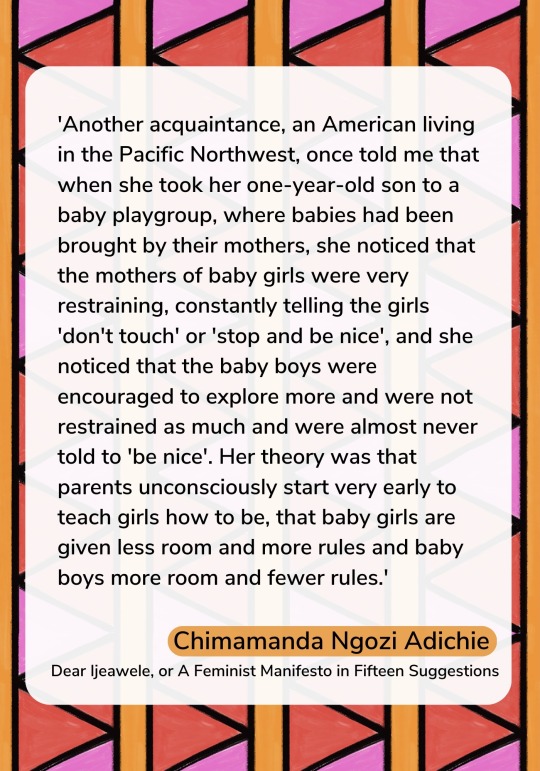
'Another acquaintance, an American living in the Pacific Northwest, once told me that when she took her one-year-old son to a baby playgroup, where babies had been brought by their mothers, she noticed that the mothers of baby girls were very restraining, constantly telling the girls 'don't touch' or 'stop and be nice', and she noticed that the baby boys were encouraged to explore more and were not restrained as much and were almost never told to 'be nice'. Her theory was that parents unconsciously start very early to teach girls how to be, that baby girls are given less room and more rules and baby boys more room and fewer rules.'
Chimamanda Ngozi Adichie
Dear Ijeawele, or A Feminist Manifesto in Fifteen Suggestions
#canva#radblr#radfem#radfems interact#radical feminism#radfems please do touch#feminism#radfem safe#radical feminst#feminist#Chimamanda Ngozi Adichie
211 notes
·
View notes
Note
4, 5, 14 & 18! ❤️
4. Movie of the year? already answered here, but the matrix baby!! where have they been all my life

5. TV show of the year? also answered here, but a runner up would be jessica jones. never expected to have this much fun watching it and YET
14. Favorite book you read this year? answered here, but another good one was dear ijeawele, or a feminist manifesto in fifteen suggestions by chimamanda ngozi adichie!
18. A memorable meal this year? can't really think of one specific meal but i, an avid sushi hater of 12 years, started eating sushi again and now i can't stop
5 notes
·
View notes
Text
Teach her to reject likeability. Her job is not to make herself likeable, her job is to be her full self, a self that is honest and aware of the equal humanity of other people.
— Chimamanda Ngozi Adichie, Dear Ijeawele, or A Feminist Manifesto in Fifteen Suggestions
#dear ijeawele#chimamanda ngozi adichie#feminism#quotes#literary quotes#literature#writing#books#spilled ink#prose#thoughts#lit#pretty quotes#quote of the day#reverie#reverie quotes#quote#book quote#book quotes#inspiring quote#inspiring quotes#beautiful quote#beautiful quotes
68 notes
·
View notes
Text
“Encourage her to speak her mind, to say what she really thinks, to speak truthfully. And then praise her when she does. Praise her especially when she takes a stand that is difficult or unpopular because it happens to be her honest position. Tell her that kindness matters. Praise her when she is kind to other people. But teach her that her kindness must never be taken for granted. Tell her that she too deserves the kindness of others. Teach her to stand for what is hers. If another child takes her toy without her permission, ask her to take it back. Tell her that if anything ever makes her uncomfortable, to speak up, to say, to shout.”
“DEAR IJEAWELE, OR A FEMINIST MANIFESTO IN FIFTEEN SUGGESTIONS”
By Chimamanda Adichie
1 note
·
View note
Text
"This is the catastrophic consequence of likeability. We have a world full of women who are unable to exhale fully because they have for so long been conditioned to hold themselves into shapes to make themselves likeable."
Dear Ijeawele, or a Feminist Manifesto in Fifteen Suggestions (by Chimamanda Ngozi Adichie)
3 notes
·
View notes
Photo

“Teach her that the idea of ‘gender roles’ is absolute nonsense. Do not ever tell her that she should or should not do something because she is a girl. ‘Because you are a girl’ is never reason for anything. Ever.” ― Chimamanda Ngozi Adichie, Book author of "Dear Ijeawele, or a Feminist Manifesto in Fifteen Suggestions" Celebrated an yearly March 8, International Women's Day is one of the most important days of the year to celebrate women's achievements, raise awareness about women's equality. Furthermore, International Women's Day is a global day celebrating the social, economic, cultural and political achievements of women. The day also marks a call to action for accelerating gender parity. Significant activity is witnessed worldwide as groups come together to celebrate women's achievements or rally for women's equality. 🌸💐💕 Happy Women's Day to strong, intelligent, talented and simply wonderful women! Don't ever forget that you are loved and appreciated. * Like me. Only a woman can almost die and give birth at the same time. Be proud to be a woman. This day belongs to you. May you prosper and stood affirm in the course of life. : #internationalwomensday #womansday #womansday2023 #internationalwomensday2023 #womansmonth #womansmonth2023 #woman #empowedwomen #pinkWednesday #pinkWednesdays #mystique #spiritique #BABAEPOAKO #BABAEKA #BABAEAKO #VirgoWoman #virgo #virgozodiac #MysticalWoman #mysticwoman #Wednesday #WednesdayVibes #virgoenergy #equality #equalityisforeveryone #womansrights #womansright #sheher 💛 #girlpower #womanpower https://www.instagram.com/p/CphRucxyAIb/?igshid=NGJjMDIxMWI=
#internationalwomensday#womansday#womansday2023#internationalwomensday2023#womansmonth#womansmonth2023#woman#empowedwomen#pinkwednesday#pinkwednesdays#mystique#spiritique#babaepoako#babaeka#babaeako#virgowoman#virgo#virgozodiac#mysticalwoman#mysticwoman#wednesday#wednesdayvibes#virgoenergy#equality#equalityisforeveryone#womansrights#womansright#sheher#girlpower#womanpower
0 notes
Text
[PDF Download] Dear Ijeawele, or a Feminist Manifesto in Fifteen Suggestions - Chimamanda Ngozi Adichie
Download Or Read PDF Dear Ijeawele, or a Feminist Manifesto in Fifteen Suggestions - Chimamanda Ngozi Adichie Free Full Pages Online With Audiobook.
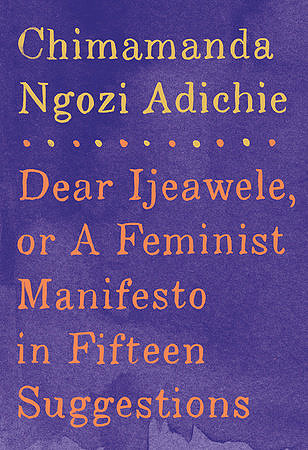
[*] Download PDF Here => Dear Ijeawele, or a Feminist Manifesto in Fifteen Suggestions
[*] Read PDF Here => Dear Ijeawele, or a Feminist Manifesto in Fifteen Suggestions
From the best-selling author of Americanah and We Should All Be Feminists comes a powerful new statement about feminism today--written as a letter to a friend. A few years ago, Chimamanda Ngozi Adichie received a letter from a dear friend from childhood, asking her how to raise her baby girl as a feminist. Dear Ijeawele is Adichie's letter of response.Here are fifteen invaluable suggestions--compelling, direct, wryly funny, and perceptive--for how to empower a daughter to become a strong, independent woman. From encouraging her to choose a helicopter, and not only a doll, as a toy if she so desires; having open conversations with her about clothes, makeup, and sexuality; debunking the myth that women are somehow biologically arranged to be in the kitchen making dinner, and that men can "allow" women to have full careers, Dear Ijeawele goes right to the heart of sexual politics in the twenty-first century. It will start a new and urgently needed conversation about what it really means
0 notes
Text
xy's media thread 2024!
I'm going to count music (with story/series) as part of this. Books I'll try to actually write my thoughts out on. Try.
Ongoing 'can't be finished' games:
garden galaxy
usagi shima
A Kinder World
Genshin
January
tress and the emerald sea
simon vs the homosapiens agenda (proper reread)
leah on the offbeat
corpse party (2021)
rise of the guardians (#3 rewatch!)
densha otoko manga
that Loveit? music vid duology ish (biz)
After Marchen [Tajima Ikuno] (i like it a lot!! aaa more chaps pls)
started:
Manga: Mushishi (again after watching an ep a couple years back! Here to try again!)
Started a webtoon, don't think I'll continue it (feels very cliche)
webtoon #2 The Pale Lady that looks really pretty
various books: red azalea, Becoming A Writer by Dorothea Brande, Steering the Craft [A 21st Century Guide to Sailing the Sea of Story] Ursula K Le Guin, Equal Rites by Terry Pratchett
NewNaratif short stories on queer ecology
February
finished snow flower and the secret fan, lisa see
animal farm, george orwell
Dear Ijeawele: A Feminist Manifesto in Fifteen Suggestions, Chimamanda Ngozi Adichie (-the sudden caps for her in respect is deserved)
interesting song: Pilvet liikkuu, minä en by Yona. really want to check her out more
started: Nights into dreams
Dungeon Meshi
The Witch and The Beast
Kusuriya no Hitorigoto (watching with friends)
The Gene of AI (excited for this!!)
Cherry Magic!! the anime
Milgram
#a little fun thing inspired by @rapidfur on twt#i'm too lazy to add photos of everything#i'll never post this otherwise so here i go#about me
10 notes
·
View notes
Text
Dear Ijeawele Part 2
I finished this book like a week ago but I forgot this in my drafts 😅
There were a few things I disagreed with, but I decided not to include my personal notes for the most part. Most of what I disagreed with had to do with femininity and marriage, and since I talk about that topic often I didn’t think it was necessary to voice my opinion here. For clarity, I’ll italicize my thoughts.
Seventh Suggestion
Don’t treat marriage like an achievement or prize. Girls are raised to value marriage more than boys, so they put more effort into maintaining an already unequal relationship.
Adichie’s explanation for why she kept her surname when she got married resonated with me, because it’s much the same reason I don’t ever want to change mine.
But the point is simply this: whether it came from my father or from the moon, it is the name that I have had since I was born, the name with which I travelled my life’s milestones, the name I have answered to since that first day I went to kindergarten in Nsukka on a hazy morning and my teacher said, ‘Answer “present” if you hear your name. Number one: Adichie!’
In a just world, women won’t be expected to do anything men are not, and women will only take their husband’s last name when they truly want to. Until then, she suggests couples pick a new name together so they both have to go through the legal process of getting their names changed.
Eighth Suggestion
Your daughter’s job is not to be likeable. Sexual predators take advantage of the fact that girls are taught not to speak up or fight back. Praise her when she takes an unpopular stance because it is her honest opinion. Teach her that kindness isn’t to be taken for granted and she deserves kindness, too.
Teach her that she is not merely an object to be liked or disliked, she is also a subject who can like or dislike. In her teenage years, if she comes home crying about some boys who don’t like her, let her know she can choose not to like those boys.
Ninth Suggestion
Give her a sense of identity. Teach her to embrace the parts of her culture that are beautiful (like pride in hard work) and reject those that are not (like misogynistic traditions). She will be flooded with images of white beauty and achievement, as well as negative images of black and African people. Teach her about black history, give her black heroes to look up to, and show her the beauty and resilience of her people. Teach her about privilege and inequality and teach her to treat others with respect regardless of occupation.
Much of this chapter focused on Igbo culture in particular, so I left out a lot of specific examples for the sake of brevity. However, I still don’t think this summary did this chapter justice.
Tenth Suggestion
Be deliberate in how you engage with her about her appearance. Teach her to be physically active in all kinds of ways. Many girls stop sports when they reach puberty, but try to encourage her through it. If she likes makeup and fashion, let her dress up. If she doesn’t, let her be. It’s misogynistic to suggest feminism and femininity are mutually exclusive.
Women are shamed for traditionally feminine pursuits, but men are not. No one makes assumptions about the intelligence of a well-dressed man, while well-dressed women are assumed to be frivolous. I agree with this point, but I also wanted to add that the expectations for a “well-dressed woman” are far higher than for a “well-dressed man,” so she will be spending more time on her appearance and less on her career and other pursuits.
Don’t link appearance with morality and don’t link hair with pain. If the school says her natural hair is unkempt then speak to the admin directly. She will learn early on what kind of beauty is valued, but teach her there are many types of beauty.
Surround her with Aunties whose qualities you want her to admire and point out what you admire about them. It’s harder to do the same with men, but if she has good male role models to look up to she will be less likely to believe gender roles are universal.
Eleventh Suggestion
Society uses biology selectively to justify societal norms. For example, physical strength is used to justify male superiority and biology is used to excuse male promiscuity but not female promiscuity. Teach her that biology is interesting but shouldn’t be used to justify social norms because societal norms are not not innate. She points out that if we used biology to justify tradition, it would make more sense for lineages to be traced by motherhood not fatherhood.
Twelfth Suggestion
Talk to her about sex. It will be awkward, but start early. She suggests using the medical terminology for body parts, but that’s up to you. Teach her that her body is her own and she shouldn’t do anything she isn’t comfortable with. Tell her to wait until she’s an adult, but be prepared if she doesn’t and make sure she knows she can come to you if she needs to. Female sexuality is weighed down by shame. Shame is control. This control isn’t for women’s health or safety, but to protect men from the consequences of their actions.
Thirteenth Suggestion
Talk to her about love and sex so she’ll come to you when she starts dating. Teach her that love is about receiving as much as it is about giving. Many women will put on a performance to show how “marriage-worthy” they are because they’re the ones who are proposed to, not the ones who are allowed to propose.
Expecting men to be the providers is misogynistic because a man’s job isn’t to provide. Whoever is more financially stable should be the provider, but in our society that is generally men. While I agree with this in theory, I believe it is more complicated in practice. Men also use feminism and “equality” to argue that they shouldn’t have to pay for dates or support their families, but I digress.
Fourteenth Suggestion
Don’t turn the oppressed into saints. People who are unkind and dishonest still deserve dignity. Women are just as human (i.e. just as capable of evil) as men. In my opinion, the fact that women are just as capable of evil as men does not mean women are just as often as evil as men.
Fifteenth Suggestion
Teach her that diversity is normal and don’t attach morality to differences. People walk different paths, and there’s nothing wrong with that as long as they’re not hurting anyone. Teach her not to universalize her experience. This isn’t the same as being ‘non-judgemental,’ which can devolve to ‘doesn’t have an opinion on anything’ or ‘keeps her opinion to herself.’ In other words, teach her to be full of opinions, but ensure those opinions come from a kind, informed place.
#book review#book recs#reading list#Dear Ijeawele#a feminist manifesto in fifteen suggestions#chimamanda ngozi adichie#radfems interact#radfem safe#radfems please interact#radfems please touch#radfems#terfs interact#terfs do interact#terfs do touch#terfs please touch#terfs please interact
16 notes
·
View notes
Text
Teach her to reject likeability. Her job is not to make herself likeable, her job is to be her full self, a self that is honest and aware of the equal humanity of other people. Remember I told you how upsetting it was to me that our friend Chioma would often tell me that 'people' would not 'like' something I wanted to say or do? I always felt, from her, the unspoken pressure to change myself to fit some mould that would fit an amorphous entity called 'people'. It was upsetting because we want those close to us to encourage us to be our most authentic selves.
Please do not ever put this pressure on your daughter. We teach girls to be likeable, to be nice, to be false. And we do not teach boys the same. This is dangerous. Many sexual predators have capitalized on this. Many girls remain silent when abused because they want to be nice. Many girls spend too much time trying to be 'nice' to people who do them harm. Many girls think of the 'feelings' of those who are hurting them. This is the catastrophic consequence of likeability. We have a world full of women who are unable to exhale fully because they have for so long been conditioned to fold themselves into shapes to make themselves likeable.
So instead of teaching Chizalum to be likeable, teach her to be honest. And kind.
– Chimamanda Ngozi Adichie (2016) Dear Ijeawele, or a Feminist Manifesto in Fifteen Suggestions, pp. 36-7.
#chimamanda ngozi adichie#feminist manifesto#feminism#femininity#gender#girlhood#patriarchy#rape culture#lilac posts
8 notes
·
View notes
Text
The shame we attach to female sexuality is about control. Many cultures and religions control women's bodies in one way or another. If the justification for controlling women's bodies were about women themselves, then it would be understandable. If, for example, the reason was "women should not wear short skirts because they can get cancer if they do." Instead the reason is not about women, but about men. Women must be "covered up" to protect men. I find this deeply dehumanizing because it reduces women to mere props used to manage the appetites of men.
-Chimamanda Ngozi Adichie, Dear Ijeawele, or, A Feminist Manifesto in Fifteen Suggestions
154 notes
·
View notes
Photo
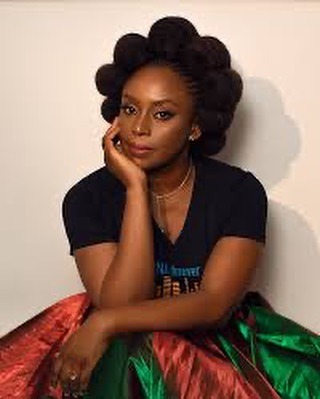
Chimamanda Ngozi Adichie (born September 15, 1977) is a Nigerian writer whose works range from novels to short stories to nonfiction. She was described in The Times Literary Supplement as "the most prominent" of a "procession of critically acclaimed young anglophone authors [who] is succeeding in attracting a new generation of readers to African literature". She has written the novels Purple Hibiscus (2003), Half of a Yellow Sun (2006), and Americanah (2013), the short story collection The Thing Around Your Neck (2009), and the book-length essay We Should All Be Feminists (2014). Her most recent book, Dear Ijeawele, or A Feminist Manifesto in Fifteen Suggestions, was published in March 2017. In 2008, she was awarded a MacArthur Genius Grant. #africanhistory365 #africanexcellence https://www.instagram.com/p/Cihq-diLMTiWRFyLSdQ6EXQVfVZRdGAJqKRh3c0/?igshid=NGJjMDIxMWI=
0 notes